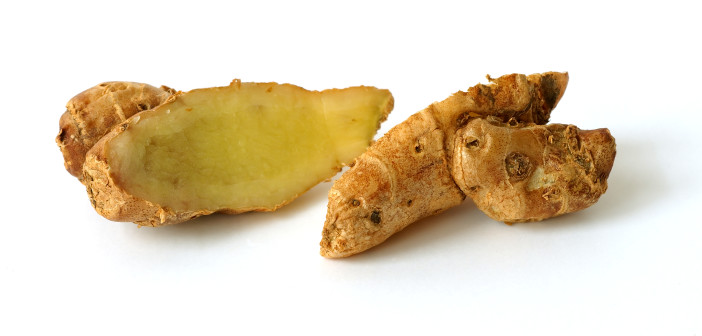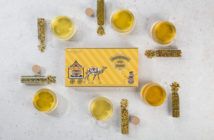Indigenous healers, herbalists, medicine men, shaman and ancient folklore have known for thousands of years that Mother Nature’s cornucopia is abundant with all manner of plants with the power to heal. Dr. Norman Farnsworth, noted for his work in Pharmacognosy, said it best when he pointed out that “for every disease that afflicts mankind, there is a treatment or a cure occurring naturally on this earth.”
It is this understanding of plant medicine that pointed me in the direction of medicinal herbs. Having already discovered our beloved Camellia sinensis I’m always looking for other herbs with the potential to significantly improve my health and well being. In that search I’ve discovered that ginger, a common spice, is nothing short of a wonder drug.
No one knows the exact origins of ginger but it’s clear that its properties have been valued for thousands of years. The earliest recordings appear in Sanskrit which suggests India as the country of origin although others argue that the tropics of Southeast Asia are a more likely origin. Ginger is documented in ancient Greek, Roman and Arabic medical literature.
In the earliest writings in traditional Chinese and Ayurvedic (Indian) healing systems, ginger is portrayed as a gift from god. Ancient Chinese pharmacopoeias suggest “long term usage of fresh ginger would put a person in contact with the spiritual effulgence’s”. Ayurvedic practitioners named ginger “vishivabhesag” which means “the universal medicine” and it is still used in a majority of Ayurvedic formulations.
This unusual shaped rhizome is sometimes mistaken for a root. A pungent perennial, ginger is one of 1,400 species belonging to the zingiberaseae family. Turmeric and cardamom are also members.
Ginger is the most widely cultivated spice in the world, due in large part to its profound medicinal properties and delightful flavor. As tea drinkers, we’re in an ideal position to make fresh ginger tea which gives us a variety of benefits. There are at least 17 different demonstrated effects of ginger.* I focus on four in this article: anti-inflammatory, antithrombic, immune enhancing and antiemetic.
If you can bear with me for a brief course in bio-chemistry 101, I think you’ll easily get a sense of how this remarkable herb works.
An important chemical reaction within the body involves compounds called eicosanoids which provides the chemical precursor for the inflammatory/anti-inflammatory components of our immune system. These elements come into the body through unhealthy dietary fats and when they get out of balance, numerous diseases can evolve. Given the classic American diet (SAD – Standard American Diet) which we’re inflicting around the world, it’s easy to see how too much dietary fat, think cheese burgers and French fries can contribute to an undesirable balance of eicosanoids.
The most life threatening health consequences is inflammation throughout the body and more viscous or clot prone blood. For those with heart disease or arthritis, each of which has reached epidemic levels, this type of imbalance is devastating. As eicosanoids also play a key role in maintaining a vibrant immune system, weakened immune function adds another nail to the coffin when this imbalance occurs.
Everyone is familiar with the inflammation that occurs when you cut or injure your hand. It is the cornerstone of our body’s immune system to bring additional nourishment and healing activity to the injury. When inflammation persists however, it damages the body and causes illness. It has become increasingly clear that chronic inflammation is the root cause of countless diseases, including heart disease, many cancers, and Alzheimer’s disease, diabetes, arthritis, and auto immune diseases such as lupus. By consuming ginger tea daily, we have the ability to reduce the incidence of chronic inflammation.1
How many people do you suppose take aspirin daily as recommended by their cardiologist? We have the illusion that “baby” aspirin will harmlessly thin our blood and reduce incidents of stroke and heart attacks. We’re also under the misguided expectation that it must be safe since we don’t even need a prescription. What people are generally unaware of is that aspirin, a popular NSAID (non steroidal anti-inflammatory drug) causes microscopic gastrointestinal bleeding as a side effect…..oops?
I’m not suggesting that taking an occasional aspirin or ibuprofen is a problem, but taking a daily dose over months, years and decades certainly isn’t good for your gut. Research shows that taking ginger has the same benefits of thinning the blood and inhibiting an enzyme in the blood that facilitates blood clotting (anti-thrombic) and without side effects.2 Nothing is easier than popping a pill but ginger is also available in capsules so why not consider switching to a natural remedy that’s free of unwanted side effects.
This powerful herb is also known to potentiate certain prescription drugs, essentially making the medicine more potent. It would certainly be an added benefit if you were able, under your doctor’s supervision, to reduce the dose of your prescription drugs as a result of taking ginger daily. Lower dosage means fewer side effects so it’s quite desirable. Remember, ALL prescription drugs have side effects. As a general rule, herbs don’t when taken in the correct dosage.
Of all of ginger’s powerful effects, its anti-nausea and antiemetic (vomiting) properties are probably the most well known. Back in 1982, it was Daniel Mowrey’s research3 which demonstrated the superiority of ginger over dimenhydrinate, the popular prescription drug for motion sickness, that has trickled down to people around the globe.
Also in the 1980’s, research at the University of Alabama reported that patients who received ginger after chemotherapy, reported less severity and duration of nausea.4 approximately 90 percent of all patients receiving chemotherapy suffer from nausea and vomiting. Nausea associated with pregnancy is another opportunity for this miraculous herb. Technically called hyperemesis gravidarum, nausea and vomiting can be a significant problem for at least half of otherwise normal pregnancies. Using fresh ginger and decocting an herbal tea seems a simple and effective method to ease this discomfort.5 When taken during the first trimester of pregnancy, the most conservative recommendation would be to consume no more than 1 grated teaspoon when decocting fresh ginger.
The icing on the cake for this cardiotonic herbs is antioxidant action that actually strengthens the cardiac muscle6 and lowers serum cholesterol.7 If you’ve got heart disease or a family history of heart disease, why aren’t you taking ginger every day?
If I’ve managed to peak your interest in this remarkable and safe herb, I would recommend Paul Schulick’s paperback book Ginger- Common Spice & Wonder Drug. Dr. Andrew Weil, considered by many the father of complementary or alternative medicine, calls this book “A wonderful collection of information. A convincing case.”
Footnotes:
- Srivastava, K.C., and Mustafa, T. “Ginger (Zingiber officinale) in rheumatism and musculoskeletal disorders.” Medical Hypotheses 39, no. 4 (Dec. 1992): 342-48.
- Srivastave, K.C. “Isolation and effects of some ginger components of platelet aggregation and eicosanoid biosynthesis” Prostaglandins, Leukotrienes and Medicine 25, nos. 2-3 (Dec. 1986): 187-98.
- Mowrey, D. B., and Clayson, D. E. “Motion sickness, ginger and psychophysics.” Lancet 20, no. 1 (8273) (Mar. 1982): 655-57.
- Pace, J.D. “Oral ingestion of encapsulated ginger and reported self-care actions for the relief of chemotherapy-associated nausea and vomiting.” Dissertation Abstracts International (Sci) 47, no. 8 (1987): 3297.
- Fischer-Rasmussen, W., Kjaer, S.K. Dahl, C., and Asping, U. “Ginger treatment of hyperemesis gravidarum.” European Journal of Obstetrics, Gynecology, and Reproductive Biology 38, no. 1 (Jan. 1991): 19-24.
- Kobayashi, M., Shoji, N., and Ohizumi, Y. “Gingerol, a novel cardiotonic agent, activates the Ca2+- pumping ATPase in skeletal and cardiac sarcoplasmic reticulum.” Biochimica et Biophysica acta 903, no. 1 (18 Sept. 1987): 96-102.
- Tanabe, M., Chen, Y.D., Saito, K., and Kano, Y. “Cholesterol biosynthesis inhibitory component from Zingiber officinale roscoe” Chemical and Pharmaceutical Bulletin (Tokyo) 41, no. 4 (Apr. 1993): 710-13.
*17 Different Demonstrated Effects of Ginger
- Analgesic
- Antidiabetic
- Anthelmintic
- Antithrombic
- Antiulcer
- Antibacterial
- Antiemetic
- Anti-inflammatory
- Antitumor
- Antiviral
- Anticathartic
- Antifungal
- Antimutagenic
- Antitussive
- Hypocholesteremic
- Immune supportive
- Thermoregulatory




